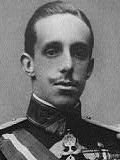 |
Alfonso XIII
b. 17 May 1886, Madrid, Spain
d. 28 Feb 1941, Rome, Italy |
| Title: |
Por la gracia de Dios y la Constitución, Rey de España (By the Grace of God and of the Constitution, King of Spain) |
| Term: |
17 May 1886 - 14 Apr 1931 |
| Chronology: |
17 May 1886, proclaimed king at birth under the regency of his mother, Queen María Cristina [1] |
|
17 May 1902, assumed government in person upon attaining majority in accordance with Art. 66 of the Constitution of 1876; took the oath of allegiance, joint session of the Senado and Congreso de los Diputados, Palacio del Congreso, Madrid [2] |
|
14 Apr 1931,
ceased to exercise the functions of office upon leaving national territory [3] |
| Names/titles: |
Baptized (22 May 1886): Alfonso León Fernando María Santiago Isidro Pascual Antón de Borbón y de Austria |
| Biography: |
| Son of King Alfonso XII and Queen María Cristina, who was born almost half a year after the death of his father; until he reached the age of sixteen, the royal authority was vested in the regency of his mother, whose influence remained considerable even after the formal end of the regency (17 May 1902); was educated as military officer; married (31 May 1906) Victoria Eugenie of Battenberg, a niece of King Edward VII and a granddaughter of Queen Victoria; suffered a great loss of popularity due to the abuse of parliamentary system by corrupt politicians and suppression of working strikes, notably in Bilbao and Catalonia (1909); failed to win public confidence and survived five attempts of assassination between 1906 and 1932, including the first one when a bomb was thrown at his wedding coach; was blamed for the Spanish defeat in the Moroccan War (1921) with the Riff tribes; associated himself with the military dictatorship of Miguel Primo de Rivera (1923-1930), who was invited by the king to set up an autocratic state; agreed to holding municipal elections (12 Apr 1931) which resulted in an overwhelming victory for the Republicans; refused to abdicate and left Spain (14 Apr 1931), stating that he would await the expression of popular sentiment; was declared guilty of high treason (12 Nov 1931) by a committee set up by the Cortes Constituyentes (Constituent Cortes); settled in Rome, Italy, where he died ten years later. |
| Biographical sources: Enciclopedia de Historia de España. Diccionario biográfico. (Madrid: Alianza Editorial, 1991). |
| |
| [1] |
Gaceta de Madrid, martes 18 de Mayo de 1886. Núm. 138. P. 483. |
| [2] |
Diario de las sesiones de Cortes: Senado: Sesión Regia, celebrada el día 17 de Mayo de 1902, con ocasión de recibir las Cortes á S.M. el Rey Don Alfonso XIII el juramento de guardar la Constitución y las leyes. Numero 35. P. 719. |
| [3] |
Gaceta de Madrid, miércoles 15 de Abril de 1931. Núm. 105. PP. 193-195. |

